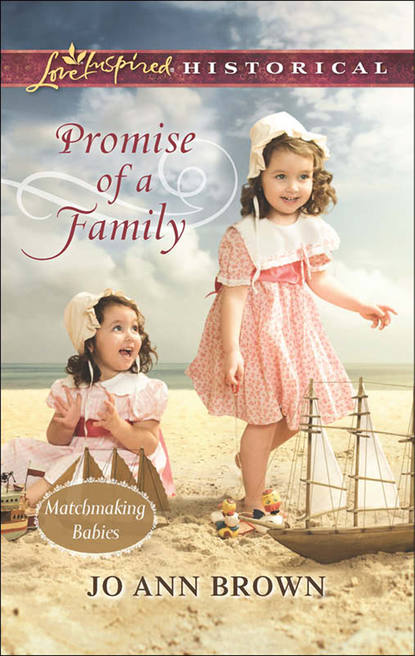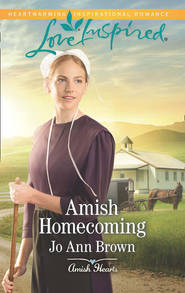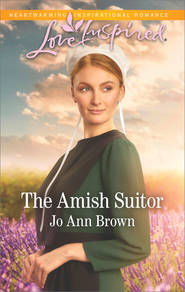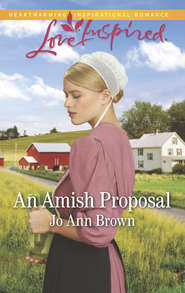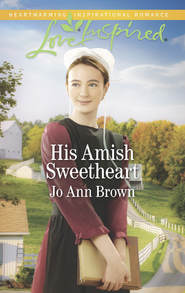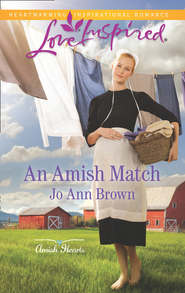По всем вопросам обращайтесь на: info@litportal.ru
(©) 2003-2024.
✖
Promise of a Family
Настройки чтения
Размер шрифта
Высота строк
Поля
Drake changed the subject that was making them both even more uncomfortable. “I asked Parson Trelawney if anyone had reported any missing children, and he said no.”
Lady Susanna waved in response to a greeting called out to her by a young auburn-haired woman who stood in the doorway of the village’s main shop. The earl’s daughter called for the carriage to stop.
The redhead hurried over. “You have heard about the children?”
“Yes. Captain Nesbitt came to the house to explain how he found them floating in a jolly boat.” She paused, then introduced Drake to the other woman.
Elisabeth Rowse was almost as tall as he was. Her face was plain, but her bright green eyes glowed with intelligence and kindness. When she smiled as she greeted him, her whole face transformed. The mouth that had looked too wide now was an amazing grin.
“I hardly believed what I heard when a lad came to the shop looking to buy milk,” Miss Rowse said. “Six children abandoned in a boat. Have you ever heard of its like, Susanna?”
Drake was astonished how casually Miss Rowse addressed an earl’s daughter, but said nothing until Lady Susanna bade the redhead a good day and ordered the driver to continue toward the strand. His amazement must have been visible, however.
“Elisabeth is betrothed to my brother Raymond,” Lady Susanna said. “They plan to be married soon.” Without a pause for a breath, she continued, “Do you think the children were stolen?”
“It is a possibility.” He would have to be on his toes, because Lady Susanna had a quick, tireless mind. “Overlooking any possibility would be unwise.”
“A horrifying possibility, I must say.”
He nodded as the carriage came around the last building on the street. In front of them, The Kestrel tilted at a steeper angle than earlier. The figurehead on the front, a hawk raising its wings to catch the air, leaned so low that its feathers almost touched the water. Instead of his men plugging the leak, they must have come out to watch him and Benton tug the jolly boat out of the water. He scanned the beach, but there were so many people gathered there that he could not see his men.
“That ship by the quay looks ready to be torn apart and sold for scrap,” she said with a shake of her head. “Why would anyone leave a ship in that condition in our harbor?”
“Because it is being repaired. Before you ask how I know, I will tell you that is my ship.”
“Oh.”
He had startled her, because she did not have a retort.
“It was damaged in battle with a French privateer,” he added when a flattering blush climbed her cheeks. Not being on the defensive with her was a change. “It is nearly repaired, but we discovered another leak today. By the morrow, if all goes well, she will be proudly afloat once more.”
“Was anybody killed?” she asked in a strained voice.
“Not among my men, but a couple of the French pirates did not survive.”
“Papa laments that if the war continues much longer, Napoleon will have the chance to build many more vessels to harry our ships.” She looked back at him, her face troubled.
He wondered if that was the first honest emotion she had shown other than her distaste for him. “Britain and our allies are winning more often than not in the Peninsular campaign.”
“But Boney is a wily adversary with dreams of ruling the world. If he cannot have Spain, he will look elsewhere for lands to make his own. Mark my words.”
Drake smiled in spite of his determination to keep distance between them. Her logic was undeniable, especially as he had argued much the same himself when he and members of his crew sat around the table in the wardroom.
“Everyone in Porthlowen must be on the beach, save for the few we saw along the street,” Lady Susanna said, drawing his attention to the throng on the strand.
“Curiosity is compelling.”
“Especially when this may be the most exciting thing to happen here.” Again she gave him a half smile. “Perhaps ever.”
He nodded. The villagers were accustomed to ships coming and going in every possible condition, and no one in the village had blinked when The Kestrel barely made it to the quay. Even marching the French prisoners of war through the village to where they could be handed off to the local militia to be taken to Dartmoor Prison had caused little more than a slight stir.
A jolly boat filled with children was something else entirely.
“Is that why you are asking all these questions, my lady? Because you are curious?”
Her frown returned. “I am asking because I want to be prepared for what needs to be done to help the children. I prefer not to be surprised.”
The carriage stopped, saving Drake from having to answer. He got out and held up his hand to Lady Susanna before the coachman could. When she placed her slender hand on his much broader one, it was as light as a spring breeze. She stepped out, the fringe on her shawl brushing his arm. A flowery scent teased him, so faint that he had not noticed it until now when she stood beside him, closer than when they had been seated in the carriage.
She withdrew her hand and edged away, looking everywhere but at him. “Captain Nesbitt, if you will lead the way, please.”
He considered offering his arm but told himself not to be addlepated. She was lovely, but he had been betrayed once by a beautiful woman. Not that it mattered. Lady Susanna Trelawney made it clear with every word and action that she considered him a bothersome disruption to her day. Maybe he should be grateful that she was more honest than Ruby had been.
Never again.
“This way,” he said gruffly, vexed at how he had to remind himself of what that big mistake had cost his heart. Simply because a woman smelled delightful was no reason to do more than appreciate the moment.
Drake did not look back as he walked toward the crowd. At first, he thought he might have to elbow past people who failed to move when he said, “Pardon me.”
Then Lady Susanna spoke the same words, and the villagers stepped aside as if they were the Red Sea being parted by Moses. She thanked them prettily, and Drake noticed the men touching their forelocks and the women giving a quick curtsy. The Trelawney family was well respected and perhaps even well loved in Porthlowen. When she assured the onlookers that the children would be taken to the earl’s house, the people thanked her before heading to the village and returning to what they had been doing before word of the jolly boat raced along the street. They obviously thought the matter resolved now that it was in the earl’s daughter’s hands. Maybe there was more to Lady Susanna than he had guessed.
Drake followed in Lady Susanna’s wake through the dispersing crowd and saw most of his crew surrounding the small boat. The children sat on a piece of canvas beside it. Two women who were old enough to be the babies’ grandmothers loitered nearby, handing pieces of cake to them. Another woman of the same age sniffed at the sight before pushing past Drake and Lady Susanna with a mutter about spoiling children.
“Pay Charity Thorburn no mind,” Lady Susanna said under her breath. “From what I have heard, she and the Winwood sisters have not once seen eye to eye in the past fifty years. If one of the sisters said the sea is wet, Mrs. Thorburn would argue it was dry.”
When Lady Susanna turned to greet the Winwood sisters, Drake could not help smiling. Splatters on the children’s shirts and in their hair must have come from the soup Obadiah always had ready in the galley. The elderly cook was on his knees, holding the baby. An absorbent cloth was wrapped around his finger. He dipped it into a bowl by his side; then he placed it in the baby’s mouth to let the infant suckle.
Lady Susanna bent to touch the baby’s head. She smiled warmly at Obadiah, who gave her a toothless grin in return and flushed like a new cabin boy who had stayed too long in the sun.
“ʼTis milk and water and a wee bit of honey,” Obadiah replied to a question Drake had not heard. “ʼTwill fill the mite’s belly for now. My da used the same mixture for lambs when the ewes wouldna let them nurse.”
Thanking him, she turned to where the children regarded her with wide, red-rimmed eyes. They must have been crying the whole time he spoke with the parson and the earl and while he brought Lady Susanna to the beach. He was grateful the older women had come with fresh cake. He thanked them as Lady Susanna sank to her knees beside the boat and put her hand on it as she greeted the children.
“Who is she?” asked Benton quietly as he appeared at Drake’s elbow. “Are there more like her in the village?”
Drake scowled his first mate to silence, then said, “She is Lady Susanna Trelawney, the earl’s daughter.”
Arching his brows, Benton whistled softly.
He did not have a chance to reply because Lady Susanna motioned for him to join her. Aware of the eyes of his crew and the few remaining villagers on them, he pushed down his resentment that she crooked her finger at him as if he were a dog trained to obey.
He squatted beside her and saw one of the older boys pinch the other one again. The second boy let out a shriek that was more anger than pain. He scooped up the two boys and carried them to Benton.
“Keep them apart,” he ordered as he set them at his first mate’s feet.
In an instant, the two boys were taunting each other and poking each other and ready to come to blows.
“How?” asked Benton, trying to pull them away from one another.





